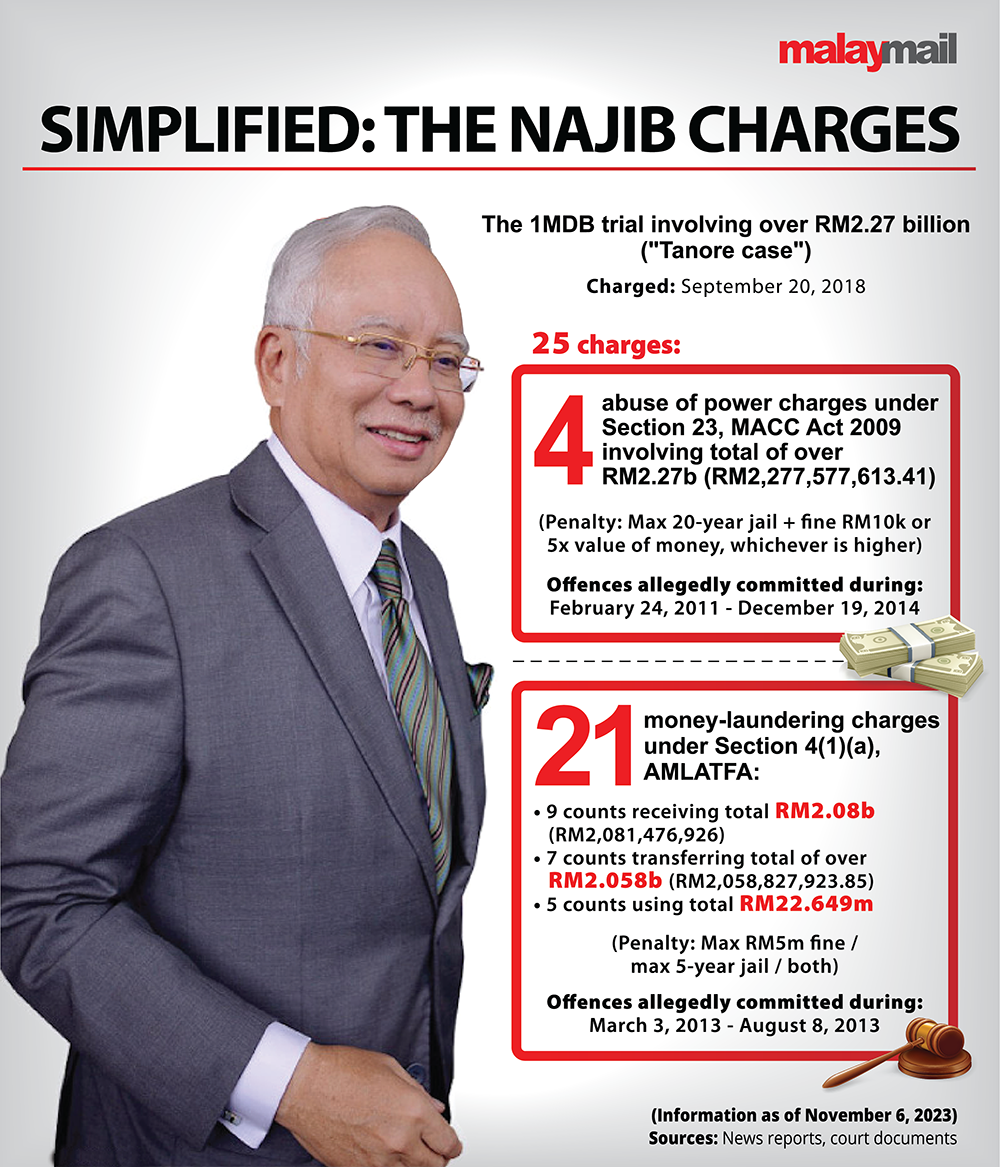KUALA LUMPUR, Oct 1 — The way former prime minister Datuk Seri Najib Razak used the millions of ringgit in his personal bank accounts for political purposes was not corrupt, his lawyer argued today.
During Najib’s trial over the misappropriation of RM2.2 billion of 1Malaysia Development Berhad’s (1MDB) funds, lead defence lawyer Tan Sri Muhammad Shafee Abdullah said that various prosecution witnesses have confirmed that his client did not use the money for personal spending, but for corporate social responsibility, social welfare and political purposes.
Asked by trial judge Datuk Collin Lawrence Sequerah if spending the money for political purpose and not for personal purpose makes a difference, Shafee argued there was a difference.
“What is important is this, it does make a difference, the answer is yes, because if I am robbing 1MDB to quote an elderly statesman — ‘perompak’, ‘penyangak’ — if I’m a robber of 1MDB money, I must be a Robin Hood to give it back by political, channelling by welfare, by CSR.
“I have to be a Robin Hood. But we have proven, Yang Arif, 99 point whatever percent of those monies went not for his personal use, like for instance, he goes and buy a yacht or buy a private plane or he treated everybody with champagne in New York bars or something like that.
“So, it is against the pathology of corruption that a person took this money and he spent it not for personal use, but for the benefit of the public as a whole, he may be a segment of the public, but he spent it,” Shafee argued in the High Court, adding however that there is no legal precedent for this situation as corruption cases are heavily based on the facts of each case.
Shafee also argued that Najib’s return of the US$620 million of the US$681 million deposited into his bank accounts allegedly showed that he did not have any bad faith, again saying there would be no past court cases that can be used as precedent for Najib’s 1MDB case.
“So if Yang Arif were to ask me, is there an authority, someone behaved like that, the answer is no. Because this is the factual finding Yang Arif has to make, would a man who steals money like that behave in that fashion, and that’s why I said it’s inconsistent with the pathology of corruption,” he argued.
Deputy public prosecutor Kamal Baharin Omar said, however, that what is important for money-laundering charges is if an accused person has dealt with illegal proceeds or money originating from illegal activities, and that the purpose of how the money is used does not matter.
Kamal Baharin also argued that for corruption cases, what an accused person does with the money does not matter, as what is important is the origin of the money.
Deputy public prosecutor Ahmad Akram Gharib similarly said that whether money in corruption cases are used for personal or political purposes is not a relevant question, while also pointing out that Malaysia’s corruption law also defines “gratification” as including donation or gifts.
Shafee then argued that the facts in this case allegedly shows that Najib does not know that the money in his bank accounts were ill-gotten.
“That’s the reason why I ask Yang Arif to examine the facts, would someone actually have knowledge that he obtained it unlawfully be spending money like that in the open? And he issued cheques, it’s not cash, so that he can be arrested? So these are the facts that Yang Arif would have to reckon with, how do you resolve these inconsistent facts with guilt?” he asked.
“But if Yang Arif asks me, is it consistent with his lack of knowledge that these monies were ill-gotten? The answer is a thumping yes, it is consistent.
“And Yang Arif, lastly of course, his behaviour in the way he spent is also consistent with what he will say and what he said in his Section 53 statement, that the purpose of this donation money was for him to utilise for political purposes and other purposes. And it is consistent with returning the money, because he didn’t find it comfortable to retain the money after the election,” he argued regarding Najib’s actions.
Throughout this trial, Najib’s lawyers have said he believed the money he had received in his bank accounts were donations from Saudi Arabia’s royalty.
Shafee cited four alleged letters from a purported Saudi prince to Najib over these purported donations, and claimed that no one had ever alerted Najib that these could be a “red flag” for the money which flowed into his bank accounts.
The prosecution had previously argued that Najib would not be able to use these four letters to defend himself as other courts had found these documents to be fabricated, while an investigating officer said the four letters have not been verified to be genuine.
In this trial, Najib is facing four power abuse charges and 21 money laundering charges over more than RM2.2 billion of 1MDB funds allegedly to have entered his two personal AmIslamic bank accounts.




















